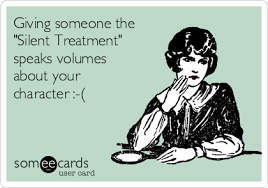“The worst sin to our fellow creatures is not to hate them, but to be indifferent to them: that is the essence of inhumanity.” – George Bernard Shaw
Have you been a target of “the silent treatment”? Or perhaps you have been the one who is committing the abuse? Yes, it is abuse. The silent treatment is basically a group of behaviors with a common objective – ignoring another person. It’s a tool often used by an emotionally immature person. Because they are self-centered, they lack empathy for the target, who is only seen as someone to fill their needs and do their bidding. This form of abuse happens in all types of relationships. It could be a family member, a friend or even a business associate. It could be you.
In reality, the silent treatment is passive aggressive violence and emotional abuse toward the person on the receiving end of the behavior. Sometimes the abuser will resort to this as a way to avoid personal responsibility. Or maybe they are unable to compromise in order to reach a reasonable resolution to a conflict or disagreement. This behavior is designed to make the abuser feel as if they are in a position of control. At the same time, it silences the target’s attempts to speak up for themselves or to be heard. Often, the result is just what the abuser wants to create: a reaction from the target.
The actions involved in the silent treatment can vary. Perhaps it is simply a refusal to speak to someone. Maybe it’s not acknowledging what another has said or pretending that it wasn’t heard. It could be a subtle action of avoiding another’s company or ignoring their requests or needs. All of these behaviors serve to make the other person feel invisible or invalid.
The tactics involved serve the abuser in a number of ways. It may be manipulation by silence when the target does not submit or comply with their demands. It is the adult narcissists’ version of a child saying, “I’ll hold by breath until you give in and give me what I want.” It could be used as punishment by denying the target’s sincere apology for something that the abuser believes was done to them. “You were late and now you’ve ruined everything.” The abuser is seeking to disempower the target when they will not tell the target what it is that has been said or done to bother them. “You know what you did.” Sometimes the abuser chooses to ignore what the target is saying or stays silent to a question or statement that requires a response. A lack of response is a way of making the abuser feel more powerful in the belief that they are now in control in a game of one-upmanship.
This behavior is harmful to both target and abuser. The abuser shows a certain meanness of spirit and immaturity. This attempt to control does not represent anything positive or loving. When there is silence, the target does not know how to interpret or react to the abuser. When someone’s very existence is ignored, it can create negative emotions such as sadness, anger and depression. Silence can feel like an accusation. The target may also feel fear or guilt, as if they have done something wrong without an understanding about what they did wrong or why the other person is acting this way. Being involved in a power play, is never healthy or productive.
There may not be shouting or physical abuse, but there is plenty of violence in the silent treatment. Research has shown that when someone feels as if they are being ignored or excluded, it creates physical pain. It can cause symptoms such as headaches and digestive problems. When we are confused and don’t know how to respond, our solar plexus chakra, the center of our personal power located in our belly, gets disturbed. Our autoimmune system is affected by this high level of stress and we are more susceptible to illness. In fact, being ignored causes the same chemical reaction in the brain as being physically hurt.
So, how do you deal with this kind of situation? Sometimes people who use the silent treatment think that it is a tool to get the other person to change their behavior or do what the other person wants them to do. It is a tool or manipulation. It can destroy a relationship.
Silence can be constructive when tempers are flaring and you need to walk away. But when silence is used as a method of control or punishment, it is abuse. Often when someone uses this type of tactic, it is a result of insecurity and very poor communication skills. The manipulator has not developed the ability to express compromise, reciprocity or a high level of empathy. The only way to find a solution to conflict is to engage in positive dialogue to resolve the issue. The longer the silent treatment lasts, the more problems are created. Silence does not solve anything.
When you recognize the signs of this kind of behavior in others, protect yourself. Do not engage. Do not tell them that the treatment hurts or angers you. It only gives them an opportunity to manipulate you. Someone who uses this tactic feeds on the negative emotions of the target. Treat them with kindness. Recognize that most likely, they are not even aware that they are doing it. They are vulnerable children. Sometime during their life experience, they were taught this behavior. They don’t know any better. They are doing the best they can with their limited insight. Remember not to take anything personally. Their behavior is about them, not about you. Be the grownup and distance yourself from toxic relationships. It creates a silence that is a far more powerful kind of treatment.
#control #abuse #manipulation #narcissist #relationships

